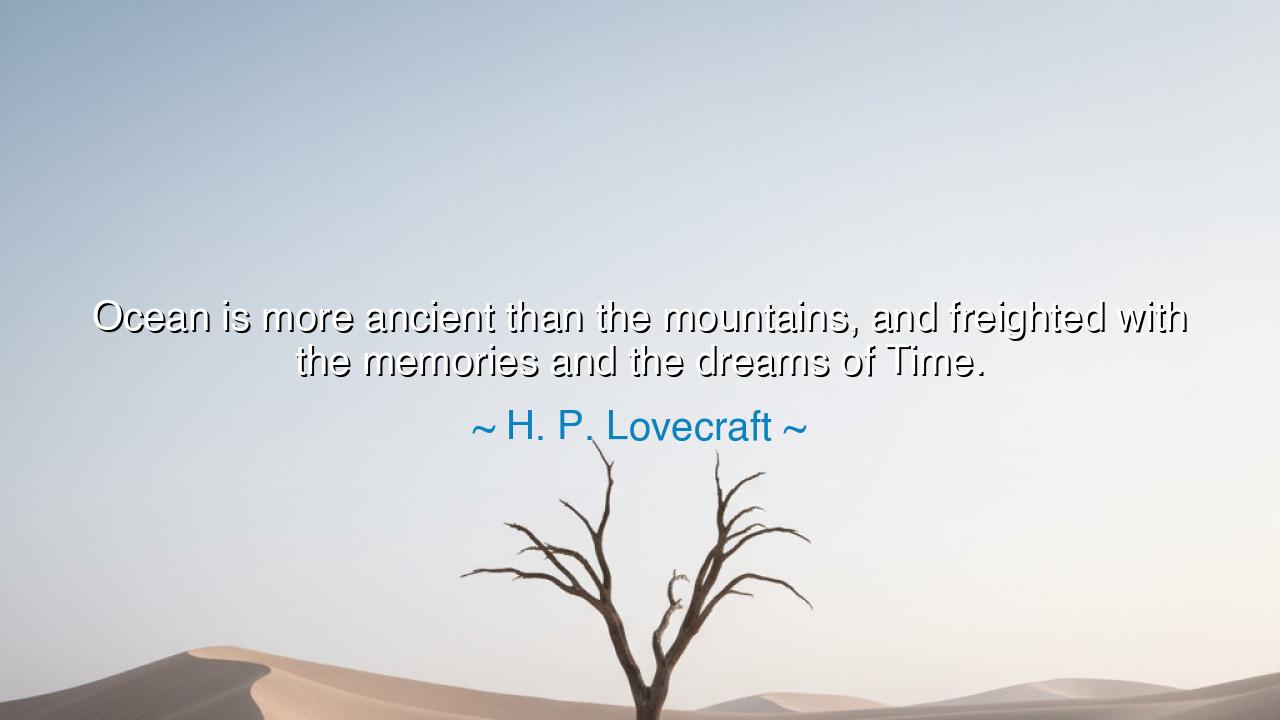
Ocean is more ancient than the mountains, and freighted with the
Ocean is more ancient than the mountains, and freighted with the memories and the dreams of Time.






The words of H. P. Lovecraft — “Ocean is more ancient than the mountains, and freighted with the memories and the dreams of Time.” — rise like a tide from the depths of eternity. They carry the weight of creation itself, the echo of the first breath of the world. In them, Lovecraft speaks not only as a writer of cosmic horror, but as a philosopher of awe — reminding us that the ocean, vast and unfathomable, is the cradle of all life and the keeper of the earth’s most ancient secrets. It existed before the first stones thrust themselves into the sunlight, before the first bird took flight, before even the whisper of man. It is older than our myths, older than our gods, older than memory itself.
To say that the ocean is more ancient than the mountains is to acknowledge the humility of mankind before the cosmos. Mountains rise and fall, shaped by time and broken by it. They are the bones of the earth, but the ocean is its blood — eternal, flowing, restless. Beneath its surface lie the remnants of worlds long gone: drowned continents, sunken civilizations, the fossils of creatures whose names we have forgotten. It is, as Lovecraft says, freighted with the memories and the dreams of Time — for within its silence lie all the stories of creation, all the forgotten beginnings of existence. Every wave that breaks upon the shore carries the echo of a billion years.
Lovecraft, who dwelt often in the shadows of the cosmic unknown, saw in the ocean a mirror of the infinite — both beautiful and terrifying. To him, the sea was not merely water; it was the abyss of eternity, the place where the boundaries between human understanding and divine mystery dissolve. In the ancient myths, the ocean was always the first god — the mother of creation, the chaos from which all form emerged. The Babylonians called her Tiamat, the Greeks named her Pontus and Thalassa. And even in Genesis, the Spirit of God moved over the face of the waters before there was light. Thus, when Lovecraft wrote these words, he was not merely describing nature — he was invoking the memory of all that ever was.
History, too, bears witness to the ocean’s power to shape destiny. Think of Homer’s Odysseus, wandering the wine-dark sea for ten long years, his fate written in the waves. The ocean tested him, transformed him, and revealed to him the nature of man’s struggle against the unknown. Or recall Charles Darwin, who voyaged across the Pacific and the Atlantic, gazing into the living memory of the ocean and discovering the laws of evolution itself. The sea taught him what the mountains could not — that life is ancient, adaptable, and vast beyond measure. The ocean, ever ancient, remains both teacher and test, giving knowledge only to those brave enough to face its mystery.
But beyond myth and science lies a deeper meaning. The memories and dreams of Time that Lovecraft speaks of are not only the earth’s — they are ours as well. The ocean within us — the salt of our blood, the rhythm of our hearts — is born of that same primal water. We carry its pulse in our veins, its silence in our souls. When we stand before the sea and feel that strange mixture of fear and peace, it is because something ancient within us remembers — remembers the first dawn, the first breath, the first movement of life upon the tide. To gaze upon the ocean is to look upon our own origin, and to feel the weight of eternity pressing gently upon the moment.
Yet Lovecraft’s vision also carries warning. The ocean may be ancient, but man is reckless. We plunder her depths, poison her veins, and forget that we are only guests upon the earth she sustains. The ancients feared the sea, and rightly so — not out of superstition, but out of reverence. They knew that to defy the ocean’s balance was to awaken the wrath of nature itself. The modern world, in its arrogance, must learn again what the ancients knew: that to live in harmony with the eternal forces is not submission, but wisdom. For the ocean has seen the rise and fall of empires, and it will see the end of ours, if we do not remember her power.
The lesson of this quote, then, is both spiritual and eternal: honor the ancient, and remember that you are but a ripple upon the surface of a timeless sea. Let the ocean remind you to be humble, to listen, to reflect. Like the tide, life rises and falls — and yet, beneath it all, there is a depth that endures. Seek that depth within yourself. Be as the ocean: vast in patience, deep in thought, silent in power. For when the waves of time have washed away the monuments of man, the ocean will remain — still ancient, still dreaming, still carrying the memories of all that ever was.






AAdministratorAdministrator
Welcome, honored guests. Please leave a comment, we will respond soon